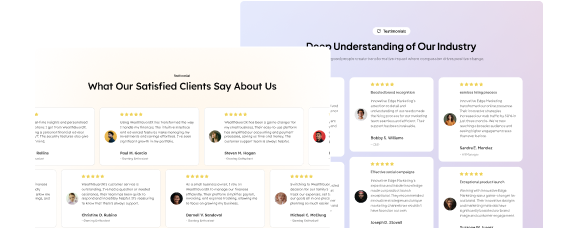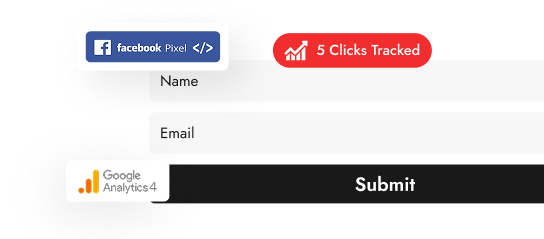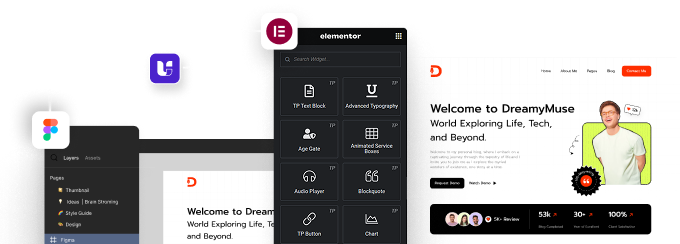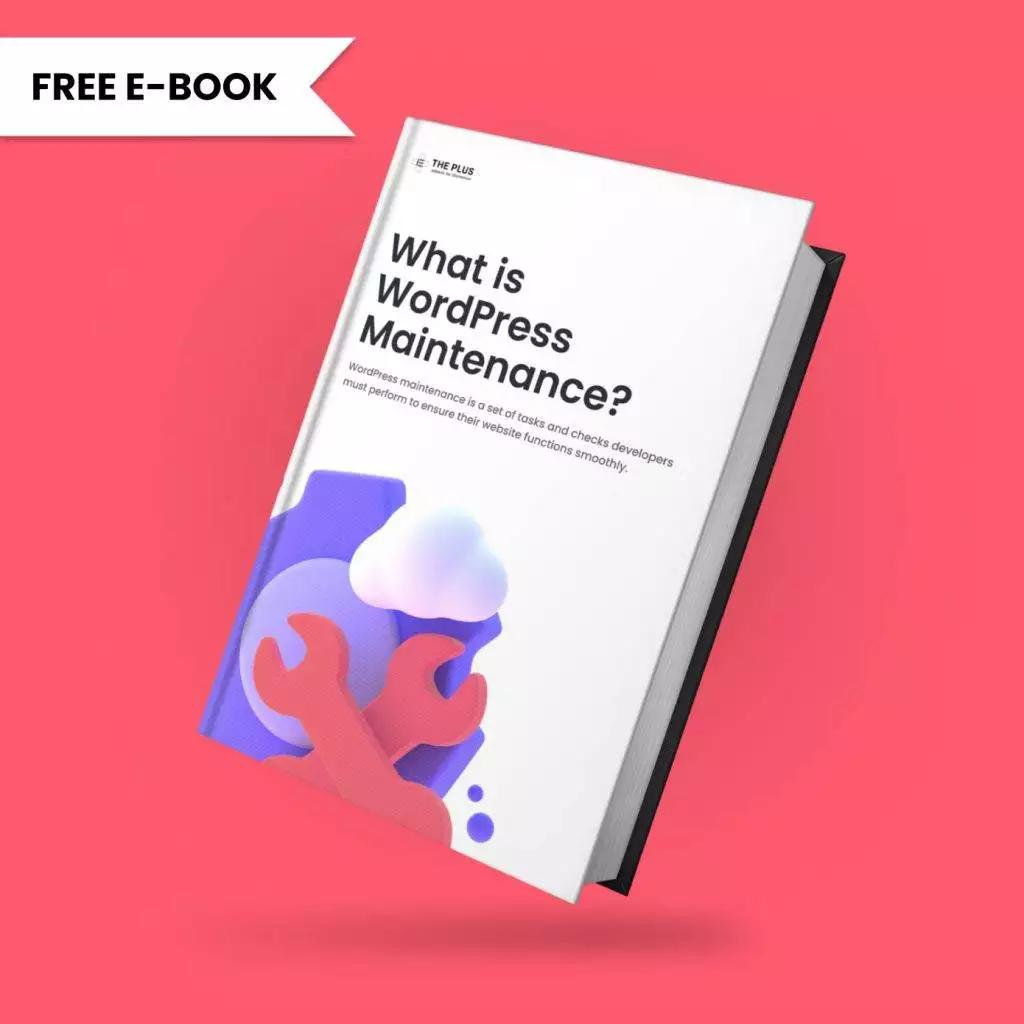If you’re using Elementor, you might be wondering if you should switch to Elementor Hosting or stick with the Elementor plugin version.
In this blog post, we’ll compare Elementor Hosting and the Elementor plugin to help you decide which one is right for you.
We’ll give you a quick rundown of everything you need to know about Elementor Hosting, from the pros and cons, to the pricing to help you make a decision.
Without further ado, let’s get started!
Elementor Hosting Vs Elementor Plugin: Overview
Elementor Plugin is a WordPress plugin that allows you to create beautiful pages and posts with drag and drop. It’s one of the most popular WordPress plugins, with over 4 million active installations.
Whereas, Elementor Hosting is a cloud-based solution that gives you access to their Web Hosting (powered by Google Cloud), including all of Elementor’s features and templates. It’s a newer product from the team behind Elementor.
While both products allow you to create beautiful pages with drag and drop, there are some key differences between the two.
Let’s take a look at some of the main differences between Elementor and Elementor Hosting.
What is Elementor?

Elementor is a simple Drag and Drop website builder for WordPress. It is one of the most popular page builders in the WordPress community, with 4M+ active installations. You can use it to create any type of website, from simple blogs to complex eCommerce stores.
One of the things that make Elementor so popular is its ease of use. You can create a website with Elementor without needing to know any coding.
This makes it a great option for all users, from beginners to experts. The plugin is also regularly updated with new features and functionality, making it a good choice for those who want a plugin that is always up-to-date.
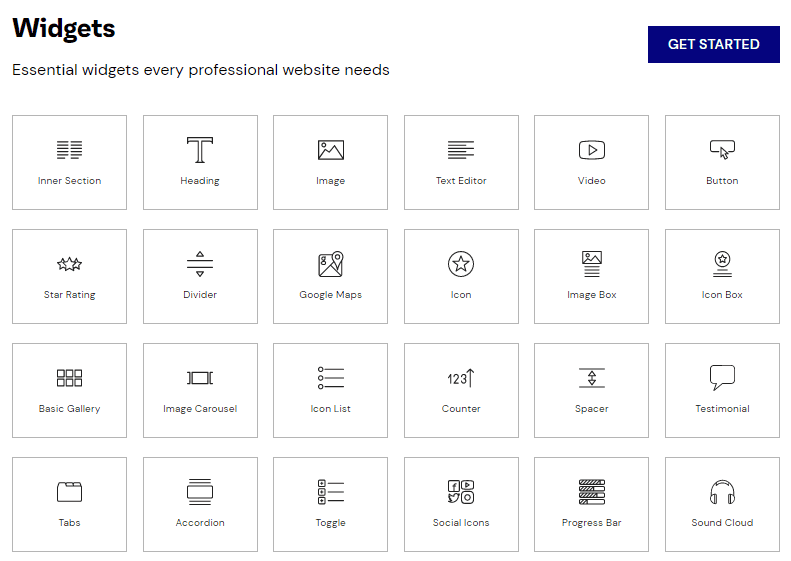
In addition to its ease of use, Elementor also has a number of other notable features, including:
- A huge selection of templates and pre-made designs: With over 150+ templates and designs, you can find the perfect one for your site without having to start from scratch
- The ability to add custom CSS and HTML
- A live preview feature that lets you see your changes as you make them
- An interactive editing experience that lets you edit your content in real-time
- It includes 90+ content modules and elements that you can choose from
- With the Pro version of Elementor, you can also modify and edit the theme’s elements using the ‘Theme Builder’ feature
- Mobile responsive: Elementor’s designs are automatically mobile responsive, so you don’t have to worry about your site looking good on all devices
- SEO friendly: Elementor’s designs are SEO-friendly, so you can be sure that your site will be well-ranked in search engines
So whether you’re a WordPress novice or an experienced pro, Elementor can help you create stunning, custom pages and posts.
Pricing for Elementor Plugin

Elements Pro comes in 4 price points and requires an annual subscription. The four packages are as follows:
- Essential Plan: $59/year for use on a single site.
- Expert Plan: $199/year for use on 25 websites (Includes Expert Website Kits and Elementor Expert Profile)
- Agency Plan: $399/year for use on 1000 websites.
You can also purchase a $99 per year plan (PRO for 3 websites)
Now, let’s take a closer look at Elementor Hosting’s features and benefits.
Were you aware that certain hosting providers have a special focus on Elementor? Check the comparison of the 8 Best WordPress Hosting for Elementor.
What is Elementor Hosting?
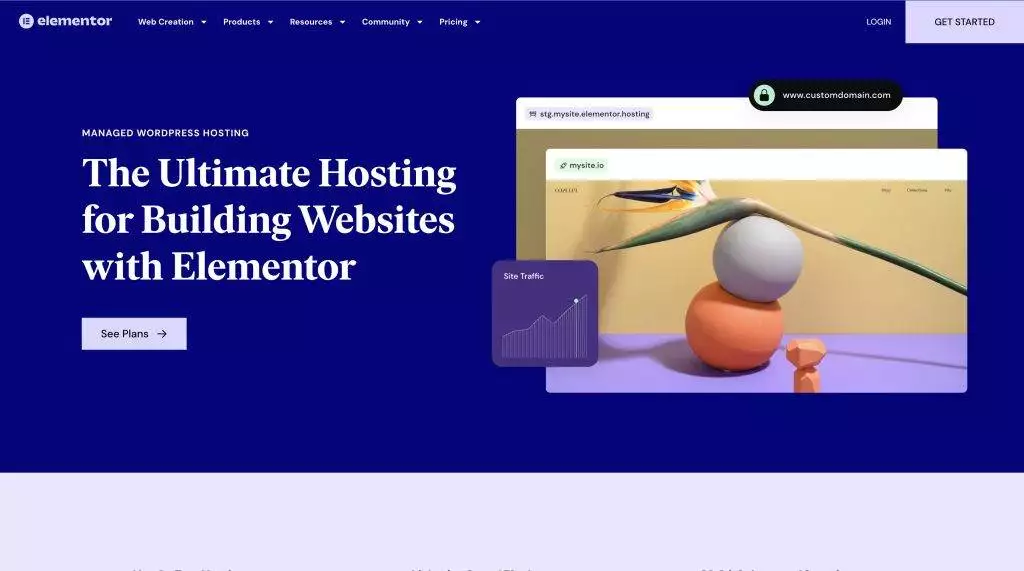
Elementor Hosting offers built-in hosting for WordPress websites powered by Google Cloud Platform as part of its new service, which allows you to connect your custom domain name.
This service also includes all the features of Elementor Pro, as well as a few additional features that are tailored specifically for WordPress hosting, such as automatic backups and one-click staging.
Unlike the Elementor plugin, which is self-hosted, you’ll get everything pre-installed with Elementor Hosting. This includes the Elementor editor, all the Elementor-designed themes, and plugins.
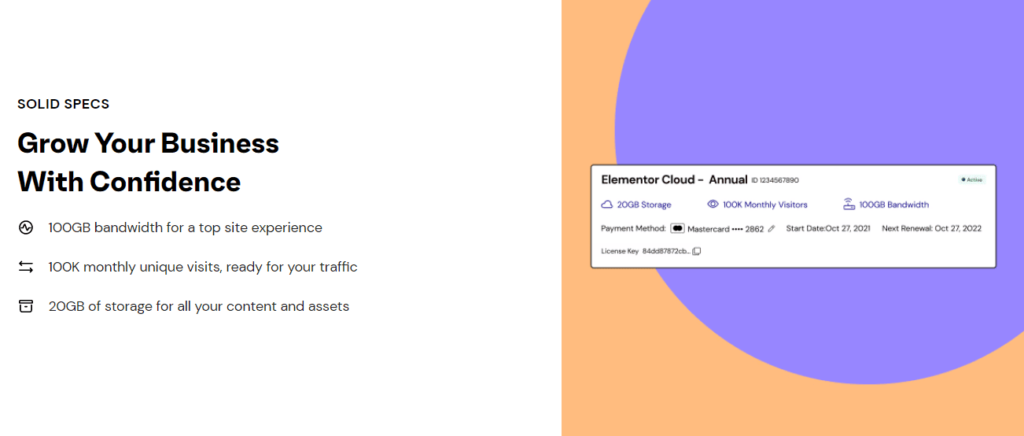
With Elementor Hosting, you can host only one website per account. However, their hosting plan still provides 100 GB of bandwidth for excellent site performance, 100K monthly unique visits, ready for your traffic, and 20 GB of storage for all your content and assets.
The Elementor Hosting also offers awesome features such as:
- Pre-installed WordPress for a quick start.
- Includes Elementor PRO license
- Automatic daily website backups
- Powerful web hosting: Dedicated environment for faster WordPress websites.
- Includes Elementor Pro’s theme builder and the full set of features.
- Free SSL protection for your website.
- With Premium Support, you’ll get 24/7 live chat support from the Elementor team.
This makes it a One-Stop Solution, where you don’t have to look any further to make your website.
Is Elementor the best-ever page builder for WordPress? Check our honest Elementor Review to find out.
Pricing for Elementor Hosting
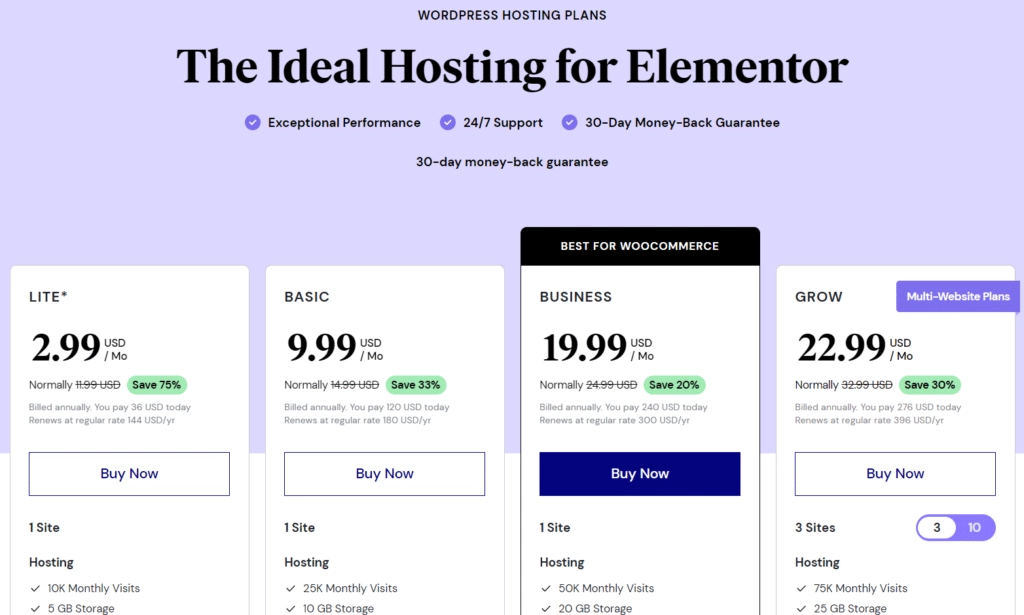
In terms of pricing, Elementor Hosting comes with these plans based on site needs & traffic –
- Lite Plan: 1 Website, $2.99/month
- Basic Plan: 1 Website, $9.99/month
- Business Plan: 1 Website, $19.99/month
- Grow Plan: 3 Websites, $22.99/month
- Scale Plan: 10 Websites, $49.99/month
You’ll get one website with all Elementor Pro features, WordPress pre-installed, and hosted on the Google Cloud Platform & Cloudflare for CDN Caching & SSL.
Although Elementor WordPress Hosting is a great platform, there are some restrictions. You cannot install the following plugins as they are incompatible:
- WP Total Cache
- Visual Composer
- Really Simple SSL
- WP Migrate
- WPVivid Backup and Restore
- VaultPress
- SiteGround Migrator
- Revolution Slider
- WP File Manager
- Duplicator
- UpdraftPlus
- JetPack
Check the complete list of incompatible plugins.
Elementor also announced a great addition to its Hosting plan recently, which you can watch below.
So let’s take a quick overview of the key differences between Elementor Plugin and Elementor WordPress Hosting.
Elementor Plugin vs Elementor Hosting: Key Differences
| Elementor Plugin | Elementor Hosting |
|---|---|
| You have to self-host on your own server, or with a web hosting company | Cloud-based Managed Hosting. |
| You can use it on multiple websites. | You can also manage on multiple websites, but currently limited to 10 sites plan. For more you need to contact them. |
| Complete control over your website data, and can install any plugin | Hosted with Elementor and Restricted controls with plugins (Learn more). |
| Can be a little complicated for beginners. | Easy-to-use with a single dashboard. |
| Depending on the plan, the price ranges from $59 to $399. | Plan ranges from $9.99 to $49.99 |
| Have to make manual backups or use 3rd party plugins | Restricts download of some plugins |
| Have to log in to my.elementor dashboard to raise ticket | Can directly raise ticket from WordPress backend |
| You have to buy your own backup plugin and connect with Cloud provider | Includes Daily-Backup, CDN, FREE SSL |
| Your Hosting company provides with FTP Access | You don’t have any FTP Access |
Elementor Cloud Hosting is a hosted solution, while the Elementor plugin is a self-hosted solution. The key difference between the two is that Elementor Hosting is hosted on Elementor’s servers, while the Elementor plugin is hosted on your own server.
Elementor Hosting has many benefits, including:
- You don’t have to worry about hosting the Elementor plugin on your server
- Elementor Hosting is always up-to-date with the latest features and bug fixes
- You get access to Elementor’s expert
- Free CDN and SSL Protection
Elementor plugin also has its own advantages, such as:
- You have full control over your data
- You can use the Elementor plugin on multiple sites
- You get to choose which features you want to use
- No limits on plugin installation, you have complete freedom
Suggested Reading : Looking for Best Elementor Addons in 2025? (With Comparison Table)
So, Which One Is Right For You?
The answer to this question may lie in your business’s goals and the needs of your website. However, If you want complete control over your website, and require a plugin that can handle complex sites, then the Elementor Plugin is the better option.
However, If you’re a complete beginner, you may find it tough to use self-hosting and to maintain your website.
You may also find it tough to keep up with the updates. That’s where using a cloud-based hosting service like Elementor Hosting comes in.
With Elementor, you can get started quickly and easily without having to worry about all the technical stuff like backups, website migration, CDN, SSL and other things.
Plus, you’ll always be up-to-date with the latest features and security updates.
To Wrap Things Up
In conclusion, Both solutions have their advantages and disadvantages, so it depends on your needs as to which one is the best choice for you. Both the plugin and the cloud version comes with a 30-day money-back guarantee
However, if you plan to build a simple blog using Elementor, then Elementor Hosting is a suitable option.
If you are running an online store, membership site, online course, and so on, we would still recommend getting your own hosting to make sure you have better control over the environment and performance of your site.
Do check out The Plus Addons for Elementor, if you’re looking for 120+ amazing extra Elementor widgets. This Addon provides access to features like Social Feed, Facebook & Google Reviews, Custom Loop Skin, Search & Filters, Preloader, Blog, Products, CPT Listing and much more. The Plus Addons is 100% compatible with both Elementor Plugin and Elementor Hosting.
In the end, It all comes down to your preferences and needs.
Further Read: Elementor now uses Containers by default, mainly Flexbox and Grid; which one should you use? Check this detailed comparison of Elementor Flexbox vs Grid Containers.










